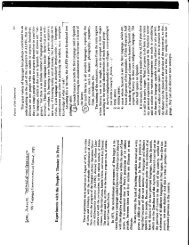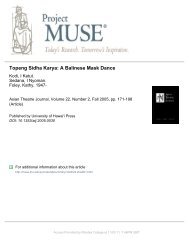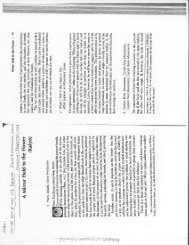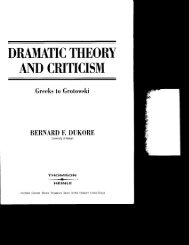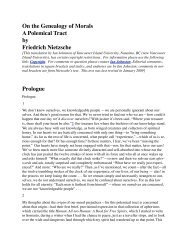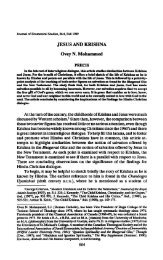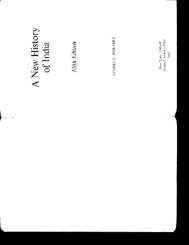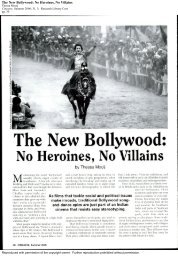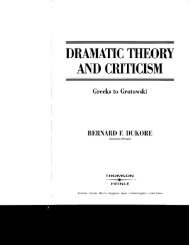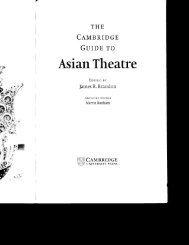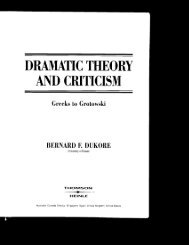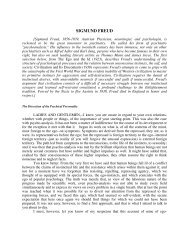Contrary Notions of Identity in As You like It - Yavanika
Contrary Notions of Identity in As You like It - Yavanika
Contrary Notions of Identity in As You like It - Yavanika
Create successful ePaper yourself
Turn your PDF publications into a flip-book with our unique Google optimized e-Paper software.
232<br />
IDENTITY IN AS YOU LIKE IT<br />
own safety and give over this attempt" (I.ii. 173-74)- falls on deaf<br />
ears. Orlando's lack <strong>of</strong> egoism and self-<strong>in</strong>terest even <strong>in</strong> the act <strong>of</strong><br />
fight<strong>in</strong>g - that action which we might normally consider to epitomize<br />
egoistic self-assertion- contrasts sharply with the heroic selfassertion<br />
<strong>of</strong> Charles, who <strong>in</strong>dulges <strong>in</strong> the typical boast<strong>in</strong>g <strong>of</strong> the martial<br />
champion. Orlando's victory over Charles thus represents the triumph<br />
<strong>of</strong> unself-centeredness, or openness and <strong>in</strong>clusiveness.<br />
That Orlando's victory is a triumph <strong>of</strong> the forces <strong>of</strong> love, or <strong>in</strong>clusion,<br />
over those <strong>of</strong> self-love, or exclusion, is further emphasized22 by<br />
the events immediately follow<strong>in</strong>g the match. Here we see that Orlando's<br />
overthrow <strong>of</strong> the exclusive, heroic ego23 embodied by Charles also<br />
overthrows what there is <strong>of</strong> his own heroic ego and that <strong>of</strong> Rosal<strong>in</strong>d,<br />
and makes love victorious: Orlando's conduct has evoked Rosal<strong>in</strong>d's<br />
love,and her ensu<strong>in</strong>g gift to him (the cha<strong>in</strong> from her neck) elicits his<br />
love. The thematic equivalence <strong>of</strong> their love with the defeat <strong>of</strong> the<br />
heroic ego, or exclusive self, is <strong>in</strong>dicated by the fact that their love is<br />
referred to <strong>in</strong> terms <strong>of</strong> Charles's (the heroic ego's) defeat. "My better<br />
parts / Are all thrown down" Orlando says after receiv<strong>in</strong>g Rosal<strong>in</strong>d's<br />
gift. Rosal<strong>in</strong>d responds, "Sir, you have wrestled well, and overthrown I<br />
More than your enemies" (I.ii.245-46, 250-51; my emphasis), and a<br />
few l<strong>in</strong>es later Orlando exclaims to himself: "0 poor Orlando, thou<br />
art overthrown! I Or Charles or someth<strong>in</strong>g weaker masters thee"<br />
(I.ii.255-56, my emphasis). Thus the literal battle constitutes a conflict<br />
between the exclusive and <strong>in</strong>clusive notions <strong>of</strong> identity, and serves<br />
as a figure for what happens with<strong>in</strong> the souls <strong>of</strong> Orlando and Rosal<strong>in</strong>d,<br />
and, as we shall see, the rest <strong>of</strong> the characters as well.<br />
II<br />
The two perspectives on identity which Shakespeare contrasts <strong>in</strong><br />
the open<strong>in</strong>g scenes may be seen to correspond, as we noted earlier, to<br />
22The symbolic significance <strong>of</strong> the event is also emphasized by parallels with Hercules'<br />
fight with Anteus. Shakespeare deliberately evokes a parallel between<br />
Orlando and Hercules, it seems, by hav<strong>in</strong>g Rosal<strong>in</strong>d say to Orlando, "Now Hercules<br />
be thy speed, young man!" (I.ii.205). In Lodge the parallel is between Charles<br />
and Hercules. Knowles notes several additional allusions to the Hercules myth and<br />
observes that "Renaissance mythographers . . . moralized the wrestl<strong>in</strong>g match<br />
[between Hercules and Anteus] as the victory <strong>of</strong> the rational soul over earthly or<br />
sensual appetite" (p. 4)-<strong>of</strong> the true self over the perverted self. In Shakespeare's<br />
treatment <strong>of</strong> the match, the opposition <strong>of</strong> true self and perverted self is expressed not<br />
<strong>in</strong> terms <strong>of</strong> rationality versus appetite, but rather as <strong>in</strong>clusiveness and love versus<br />
exclusiveness and envy.<br />
23The term "heroic ego," as I am us<strong>in</strong>g it here, is taken from James Hillman,<br />
Re- Vision<strong>in</strong>g Psychology (New York: Harper & Row, 1975), who sees the true self as a<br />
multiplicity <strong>of</strong> personalities rather than a monistic "heroic ego," as he terms it.<br />
This content downloaded on Thu, 7 Mar 2013 13:10:36 PM<br />
All use subject to JSTOR Terms and Conditions



